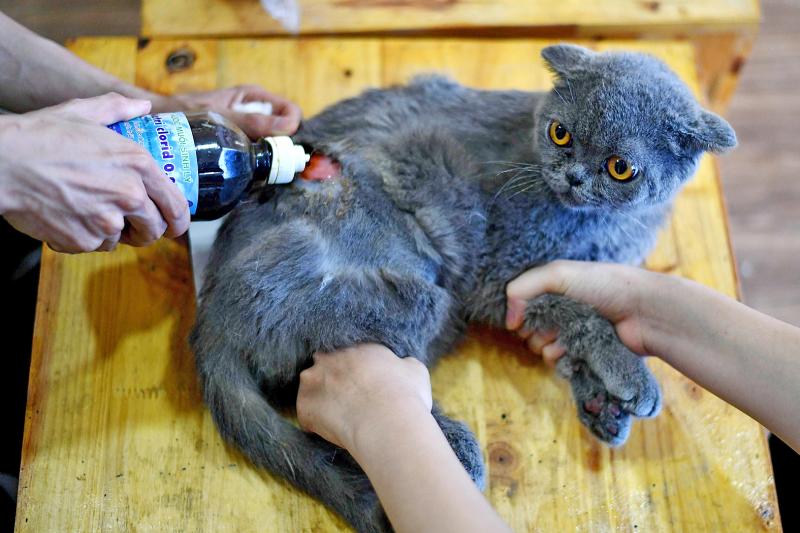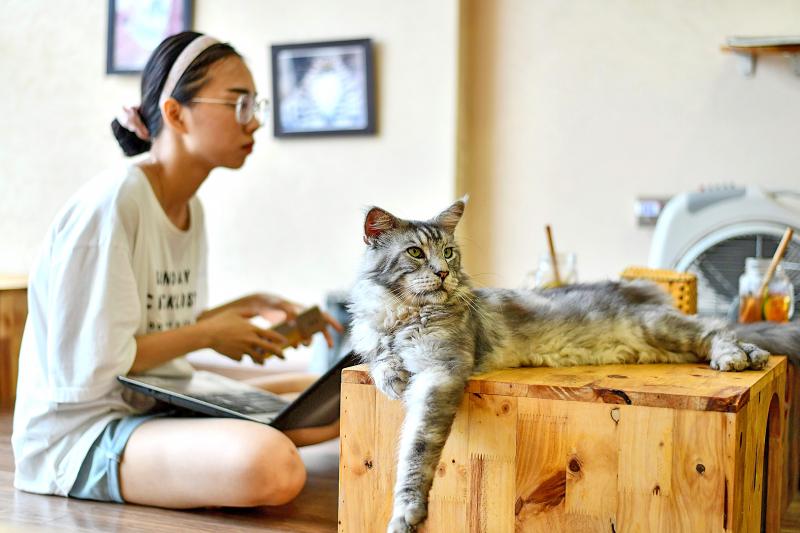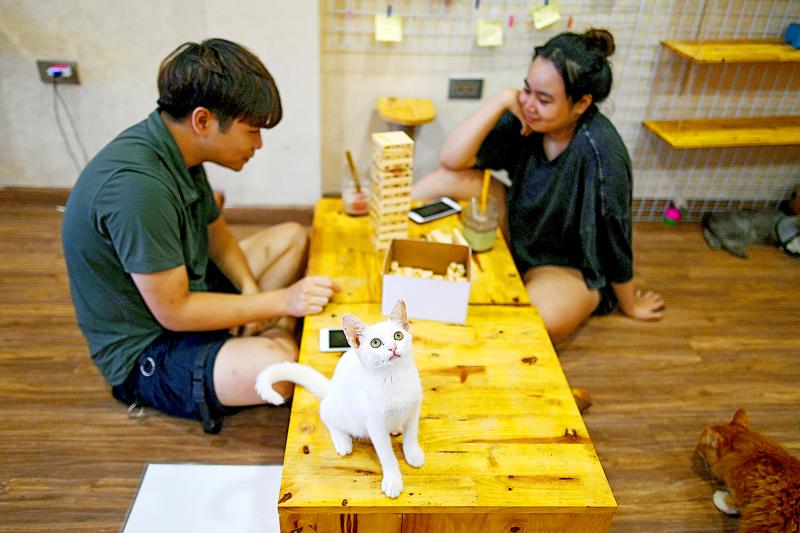If your idea of the purr-fect day is spending it curled up with convalescent rescue cats and a coffee, then one cafe in Vietnam has you covered.
Ngao’s Home Cafe in Hanoi is a loving home for 15 felines, many of whom were abandoned or found injured after being bitten by dogs or suffering serious accidents.
“I try to help cats with difficult backgrounds, to heal their physical and mental wounds,” said 24-year-old cafe owner Nguyen Thanh Binh ahead of International Cat Day on Saturday.

Photo: AFP
The cafe has clawed its way up the favorite list of many cat lovers since it opened last month, offering coffee and cuddles but also the chance to give the animals medicine and even engage with them on a deeper level.
“When I come to this cafe, apart from playing with the cats, I can hear their stories and empathise with them,” 20-year-old student and customer Le Hoang Yen said.
Many cats in Vietnam are cherished pets but others are sold for their meat, which is considered a delicacy in parts of the country.

Photo: AFP
Thieves have been known to steal cats which can then be sold on for consumption.
Owner Binh was inspired to start the coffee house, which runs as a non-profit, after spotting cats in cages, and others who had been injured by thieves.
“Once me and my friends have the cats, we first bring those who with injuries or medical problems to a vet. Then when they get better, I take them here to the cafe for even better care,” he said as he stroked a fluffy white feline, blind in one eye.

Photo: AFP
He also hopes one or two customers might be tempted to take home more than a coffee.
“I will help them find new owners — ones who really love them.”

The unexpected collapse of the recall campaigns is being viewed through many lenses, most of them skewed and self-absorbed. The international media unsurprisingly focuses on what they perceive as the message that Taiwanese voters were sending in the failure of the mass recall, especially to China, the US and to friendly Western nations. This made some sense prior to early last month. One of the main arguments used by recall campaigners for recalling Chinese Nationalist Party (KMT) lawmakers was that they were too pro-China, and by extension not to be trusted with defending the nation. Also by extension, that argument could be

Aug. 4 to Aug. 10 When Coca-Cola finally pushed its way into Taiwan’s market in 1968, it allegedly vowed to wipe out its major domestic rival Hey Song within five years. But Hey Song, which began as a manual operation in a family cow shed in 1925, had proven its resilience, surviving numerous setbacks — including the loss of autonomy and nearly all its assets due to the Japanese colonial government’s wartime economic policy. By the 1960s, Hey Song had risen to the top of Taiwan’s beverage industry. This success was driven not only by president Chang Wen-chi’s

Last week, on the heels of the recall election that turned out so badly for Taiwan, came the news that US President Donald Trump had blocked the transit of President William Lai (賴清德) through the US on his way to Latin America. A few days later the international media reported that in June a scheduled visit by Minister of National Defense Wellington Koo (顧立雄) for high level meetings was canceled by the US after China’s President Xi Jinping (習近平) asked Trump to curb US engagement with Taiwan during a June phone call. The cancellation of Lai’s transit was a gaudy

The centuries-old fiery Chinese spirit baijiu (白酒), long associated with business dinners, is being reshaped to appeal to younger generations as its makers adapt to changing times. Mostly distilled from sorghum, the clear but pungent liquor contains as much as 60 percent alcohol. It’s the usual choice for toasts of gan bei (乾杯), the Chinese expression for bottoms up, and raucous drinking games. “If you like to drink spirits and you’ve never had baijiu, it’s kind of like eating noodles but you’ve never had spaghetti,” said Jim Boyce, a Canadian writer and wine expert who founded World Baijiu Day a decade